
Walking down Walnut Street, large buildings tend to overshadow the small green spaces along the way, but if one stops to look at the Pennsylvania Horticultural Society’s pop-up garden near 20th Street, a small oasis invites passersby in.
Part of the aptly named “Hidden City” project, which creates tucked away community spaces such as the pop-up garden, colorful chairs along a table give a sense of a place of gathering. The community has come together to plant and beautify the space, and now has united once again for Public Workshop’s new project, the pop-up playground, which will be built by volunteers within the garden.
Public Workshop, an organization that unites communities through interactive design work, is at collaborating with Pennsylvania Horticultural Society’s pop-up garden. Together, they are creating a unique playground structure with the help of volunteer craftspeople. The construction event is part of one of Public Workshop’s projects, Tiny WPA, which reaches out to young people in the community in the hopes that they will seek to become community leaders through public construction and design efforts. As part of Tiny WPA, building the playground in Center City is a major source of community bonding.
Alex Gilliam, the founder of Public Workshop and the driving force behind the pop-up garden playground event, called its initiative “multi-tiered”: that the focus should not only be on the final product, a structure that will be available to families for their young children to play on and explore, but also on the process of creating of it.
“I don’t believe everyone can be a designer, but I believe we can engage people in meaningful design,” Gilliam said.
The playground-building project attracted people of all ages and skill levels, ranging from high school and college students hoping to get involved with a community activity to experts with design experience. Gilliam himself was actively involved on site.
The project originated based on an idea from Hilary Jay, the founding director of DesignPhiladelphia, who contacted Gilliam about the pop-up garden space and suggested using it as a community design opportunity. A volunteer date on Oct. 13 included her organization’s involvement, though there were other opportunities beginning in early October to participate in the creation of the playground. Thursday Oct. 11 was the date of a community “Buildathon,” during which volunteers of all ages could get together for hours of experimentation with the construction of the playground. The “highly visible public space,” as Gilliam called the garden, facilitated community feedback and support.
“It’s been hugely empowering,” Gilliam said. Appreciative comments that he and the volunteers received allowed them to “supercharge” their work, he said.
As the Tiny WPA project hopes to accomplish with it’s efforts, volunteers included many young individuals between the ages of 16 and 26. Encouraging high school and college students to be active community members and potential leaders through constructive work is a trend that Public Workshop hopes to nurture within Philadelphia and other large, urban areas.
Amongst the young workers were people who stepped in off the street after walking by who noticed the ongoing project. In unlikely outfits for construction, but yet still without qualms, passersby were welcomed in as volunteers to build for the day. Though volunteers could sign up to take part in the playground project on Public Workshop’s website, Gilliam said spontaneous participation was welcomed.
People are inspired by the work and innovation of others, according to the theories of Public Workshop, and volunteers worked in a very thought-provoking environment. The playground did not have restrictions, limitations or even a concrete final goal, but merely the expectation that it would become a “landscape to build off of,” Gilliam said. Goals of the project were to improve the neighborhood and provide youth with leadership and design experience.
As Gilliam described his favorite designing day so far, his enthusiasm for community participation was clear in his exuberant tone.
“We had the most perfect mix team-wise,” Gilliam said. “Three teenagers, four college students, one expert and two young ladies off the street.”
This varied age group working cohesively together was the positive interaction that Tiny WPA and other such public projects created by Public Workshop aim for.
“That’s what civic engineering and leadership is all about,” Gilliam said.
Though the completed structure provided a unique and creative area for the community and local children, in particular, to enjoy, the process of building the pop-up garden’s playground was the main focus of Public Workshop’s project.
Erin Edinger-Turoff can be reached at erin.edingerturoff@temple.edu.


Be the first to comment